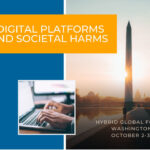The IEEE Society on Social Implications of Technology (SSIT) lost one of its leading lights when Stephen H. “Steve” Unger passed away on 4 July 2023, at the age of 92 (https://technologyandsociety.org/ssit-csit-co-founder-stephen-h-unger-dies/).



The IEEE Society on Social Implications of Technology (SSIT) lost one of its leading lights when Stephen H. “Steve” Unger passed away on 4 July 2023, at the age of 92 (https://technologyandsociety.org/ssit-csit-co-founder-stephen-h-unger-dies/).

The 2024 IEEE International Symposium on Technology and Society will be held in Puebla, Mexico, from September 18-20, 2024, at the Universidad de Las Americas, Puebla (UDLAP). ISTAS24 will be the first ISTAS conference to be held in Latin America.

The 13th IEEE Global Humanitarian Technology Conference (IEEE GHTC 2023) will take place in person at Villanova University (Pennsylvania) from October 12 to 14, 2023.

Some topics addressed on the September 13 panel included climate change challenges related to health and healthcare, contributions of computing to the climate change problem in terms of energy use, along with the potential of computing to contribute to solutions to the crisis, agriculture and food security issues related to climate change, systems design, finding solutions and improving communication across IEEE societies, carbon removal, and economic and social aspects of the crisis including forced migration, water supplies, and the responsibilities of developed nations to developing nations in climate change mitigation.

The IEEE International Symposium on Technology and Society (ISTAS 23) continued into its second day of regular programming on Thursday September 14, and included the presentation of a second panel related to climate change, this one focused on “Public Safety Technologies and Climate Change.”

We invite you to join us at Digital Platforms and Societal Harms, taking place 2 and 3 October at American University in Washington, D.C. and with keynote panels also available in hybrid mode to enable online attendance.

We invite you to join us at Digital Platforms and Societal Harms, taking place 2 and 3 October at American University in Washington, D.C. and with keynote panels available in hybrid mode to enable online attendance, and – this is where you come in – though local in-person events that can be hosted by IEEE Sections or Chapters anywhere in the world.

It is fully possible to design diets that are nutritionally adequate, with 65% lower greenhouse gas emissions, and which do not cost more than the baseline diet.

What role does and can AI play in us being able to enjoy security in our places and spaces? Perhaps we could design technology-enabled spaces for the purpose of strengthening the community and empowering community action.

The purpose of this special issue is to explore and address complex securitization-related challenges, from a broader perspective and across various dimensions and sectors, that transcend disciplinary boundaries, focusing on the role of technology relevant to the securitization of people and place, while also considering the transdisciplinarity and the socio-historical originals of securitization.

Generation Z and Millennials face different types of insider threat, in three different dimensions of space: to resources, to citizenship, and to boundaries.

It was a wonderful experience for me to live all of these events and realize later how everything is really connected. Where will new generations of kids get their “social skills” developed, considering that most of their social relations and interactions happen virtually through their phones or computers while avoiding in-person interactions?

The Society on Social Implications of Technology is one of seven IEEE technical societies that make up IEEE Division VI.

The fact that science denial is deeply implicated in identity helps explain why science deniers are usually unmoved by contrary evidence that on a purely rational level should be extremely convincing.

Listen in on this Economist podcast… featuring IEEE Transactions on Technology and Society EIC Katina Michael.

Registration Now Open! IEEE International Symposium on Technology and Society (ISTAS 2023)

Strengers, an Associate Professor of Digital Technology at Monash University, and Kennedy, a postdoc at RMIT University, Melbourne, VIC, Australia, argue that if we proceed down the current path of making our digital assistants, fembots, gynoids, and voice-activated devices look, sound, and/or behave like simulacra of women, we risk reinforcing traditional gender stereotypes in ways that could rebound on real women.

Dr. Nolan and his colleagues were responsible for developing standards to protect against radiation exposure in the laboratory and during the Trinity Test in July 1945. The physicians were continually frustrated by their inability to convince the military about the dangers of radiation but “there is considerable evidence to suggest that the doctors were ever mindful of potential legal consequences and careful to take precautions to protect themselves and the military from future litigation.”

In our time, it is not mythologies or idols in the place of God, but a new divinity, an “AI-centric” God, which according to some in the transhumanist movement, advocates for the enhancement of the human condition in terms of both its longevity and cognition. The rubrics of a divinatory algorithm would be shaped dependent on one’s philosophical or religious orientation or even all of the wisdom literature merged together.

Social media companies have intentionally created platforms that actively spread disinformation. What can we do to protect our society against disinformation? A good place to start would be limiting how large and powerful these social media platforms can get.